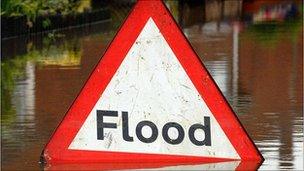Exercise Watermark to test UK's flood response
- Published

Flooding, often due to burst riverbanks, causes damage every year
The largest flood defence exercise ever held in the UK is getting under way - and will last all week.
Exercise Watermark will involve thousands of people from the emergency services, councils and utility firms.
The practical test comes in the wake of heavy criticism of failings in the official response to the floods which hit several areas in 2007.
A series of scenarios across England and Wales will test the authorities' ability to co-ordinate.
Among the scenarios in Exercise Watermark, a primary school in Sutton-on-Sea, Lincolnshire, will be evacuated and helicopters will lift people from rooftops in nearby Tattershall Lakes Country Park.
RAF helicopters will also be tasked with rescuing people from a submerged park at Bala Lake in Wales.
BBC correspondent David Shukman says one of the most glaring failures in the floods four years ago was judged to be that different organisations did not act well together.
Exercise Watermark is largely a desk exercise with officials and emergency responders forced to react to scripted events - a river bursting its banks or a North Sea storm overwhelming East Anglia.
Our correspondent says the test comes at a sensitive time for ministers as critics accuse them of making the country more vulnerable by cutting the budget for flood protection.
Environment Minister Richard Benyon said: "More extreme weather and rising sea levels mean we have to be prepared to deal with the impact of a major flood.
"Exercise Watermark will be Britain's biggest ever emergency exercise and provide a unique opportunity for us to test our responses."
£1.8m budget
Exercise Watermark will last all week, cost £1.8m and involve around 10,000 people, 10 government departments, emergency services, utility companies and communities.
It comes out of an official review by Sir Michael Pitt into the 2007 floods which devastated parts of Yorkshire, the Midlands and the West Country.
As part of the exercise, ministers will take part in mock emergency Cobra meetings and local authorities and emergency services will hold "local resilience forums" to test their responses.
Mr Benyon said the exercise was not taking funding away from flood defences, which suffered cuts under the spending review, as the money came from the emergency planning budget.
Surface water maps, estimating where water would collect in the event of flash flooding, are also being developed.
He said the government wanted to protect an extra 145,000 homes from flooding over the next four to five years.
- Published9 February 2011
- Published8 February 2011
- Published29 June 2010